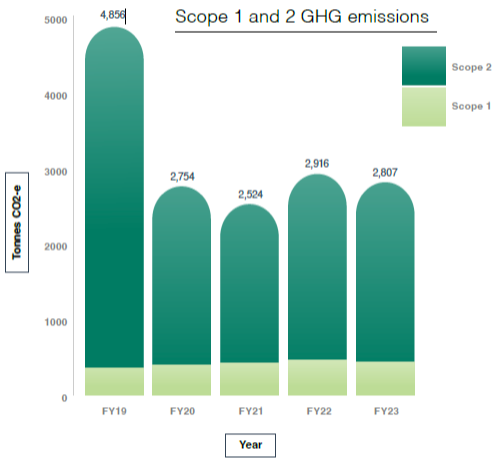As one of Australia’s largest container and general cargo ports, State Super has a small ownership percentage in the Port of Melbourne through one of our investment managers, QIC. The Port has a crucial role in facilitating trade and commerce in Melbourne and has a stated focus on sustainability, setting a Scope 1 and Scope 2 by 2030 net-zero emissions target. This commitment acts as part of the building block of the Federal Government’s investment in climate change and energy transformation priorities, including driving down emissions in the transport sector.
With a commitment to achieve net zero Scope 1 and 2 emissions by 2030, the Port aims to source 100% of its electricity from renewables and transition its corporate vehicle fleet and marine survey vessel to electric or zero-emission fuel technologies.
Source: Port of Melbourne 2023 Sustainability Report.
The decision to source electricity from renewables marks a milestone in the Port’s sustainability journey. The Port’s Scope 1 and 2 emissions are produced from fleet vehicles, marine survey vessel, and the electricity used in directly managed buildings and port infrastructure. For the last period, the Port achieved a reduction in its Scope 1 and 2 emissions by 4%.
The transition of the Port’s corporate vehicle fleet to electric or zero-emissions fuel technologies represents a strategic move towards sustainable transportation. By replacing conventional internal combustion engine vehicles with electric vehicles (EVs) or vehicles powered by zero-emission fuels such as hydrogen or biofuels, the Port is reducing air pollution, minimizing greenhouse gas emissions, and improving local air quality.
The Port will also adopt zero-emissions technology for its marine survey vessel by investing in electric propulsion systems and alternative fuel technologies, and include a renewable power purchase agreement, providing a reduction in Scope 2 emissions. A green methanol feasibility study is intended to be undertaken during 2024, following the signing of an MoU with Maersk and two potential green methanol providers. This positions the Port as a first mover in the region to become a ship refuelling hub given Australia’s latest hydrogen developments.
These initiatives underscore the Port’s proactive approach to reducing its carbon footprint, mitigating environmental impact, and driving positive change within the transportation and maritime industries. As the Port continues to implement these initiatives, these incremental carbon reductions contribute to STC’s ambition to achieve its net-zero goals.
While State Super only has a small investment in the Port, which is managed by QIC, we measure our managers’ commitment to net-zero targets through annual surveys and meetings. It is investments such as these that support our goal of achieving a 45% reduction in the weighted-average intensity of our emissions by 2030.
